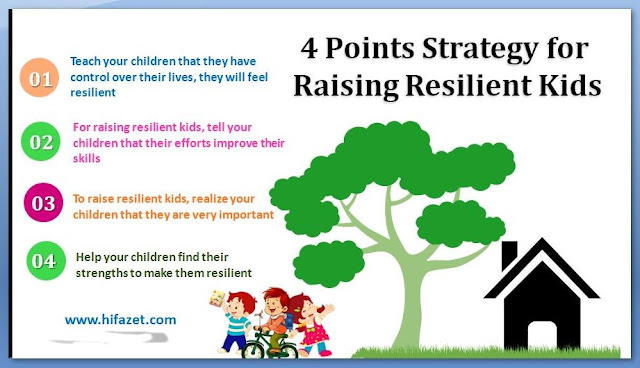How parents can raise resilient kids? Four important ways
Your child’s resilience leads to better health, greater happiness, and deeper connections. Despite the challenges that life presents them.
Life brings challenges. And whether big or small, we want our children to be resilient enough to overcome them.
Fortunately, as the researcher, Anne S. Masten emphasizes, “resilience emerges from ordinary processes”. In other words, you don’t need a crazy formula or routine to raise resilient kids. You begin by helping your children develop these four core beliefs.
1. Teach your children that they have control over their lives, they will feel resilient
Control over one’s life is synonymous with resilience. Children who feel they have some control over their lives are more resilient. They believe they have the power to shape their lives. Resilient children feel they are masters of their own destiny.
As a parent, you can teach your child this view of themselves. You can also deepen their sense of control by giving them structure and predictability. Especially in turbulent times.
You create predictability and structure for your children by setting certain rules and boundaries for them. When your care, such as providing meals and accommodation, is constant. When you set and stick to your daily routines. When you give them a space that is entirely theirs and for which they are responsible (i.e. their room, bed, desk, storage room, etc.). And especially if you consistently show them love and affection, even when they make mistakes.
2. For raising resilient kids, tell your children that their efforts improve their skills
When children believe they can grow and learn from mistakes, they are more resilient. An attitude towards growth will help your child face adversity.
People with a growth philosophy believe that they can change and grow. They know that through their efforts, application, and experience, they can improve their skills and talents. You won’t let challenges and failures stop you. Resilient children believe that they are not limited to what they take for granted.
Help your child develop a growth philosophy. When they face setbacks, remind them that they can keep trying and get better and better. It will make your kids resilient and strong.
Praise your children’s growth mentalities like, “I’m so proud you never gave up” or “You were brave to try.” This is a reminder that it is their efforts that will lead to the results you want, your natural talent is unlimited.
Share inspiring stories of yourself and others who have faced the challenges. It will help raise resilient kids. One example is Michael Jordan. While in school, he was expelled from the college basketball team. But he was working to become one of the greatest players in the NBA. Another good example is Malala Yousafzai. Who was attacked as a young girl in Pakistan for completing an education? She has miraculously recovered and is now a human rights attorney. She especially focuses on girls’ education.
3. To raise resilient kids, realize your children that they are very important
Children who feel important are more resilient to adversity. This requires others to notice them, take care of them, and rely on them. Children who do not feel important are more likely to have low self-esteem, depression, and thoughts of suicide.
Asking for help is one way your child can show that they feel important. They know that someone cares enough to meet their needs.
Listen more to your child to make them feel important. Discuss with them that how they feel. And find ways in which they can contribute to the family.
4. Help your children find their strengths to make them resilient
Resilient children can rely on their unique strengths and share them with others. When you know your strengths, you can turn your energy into something positive. It can also lead them to healthy outlets when adversity arises.
Guide your child in finding his strengths. Point out when they did things well, such as being courageous, helping others, or never giving up. Focusing on your child’s strengths can help combat low self-esteem and feelings of unworthiness.
Conclusion: Resilience has long-lasting effects on the life of an individual and parents should make conscious efforts for raising resilient kids.

